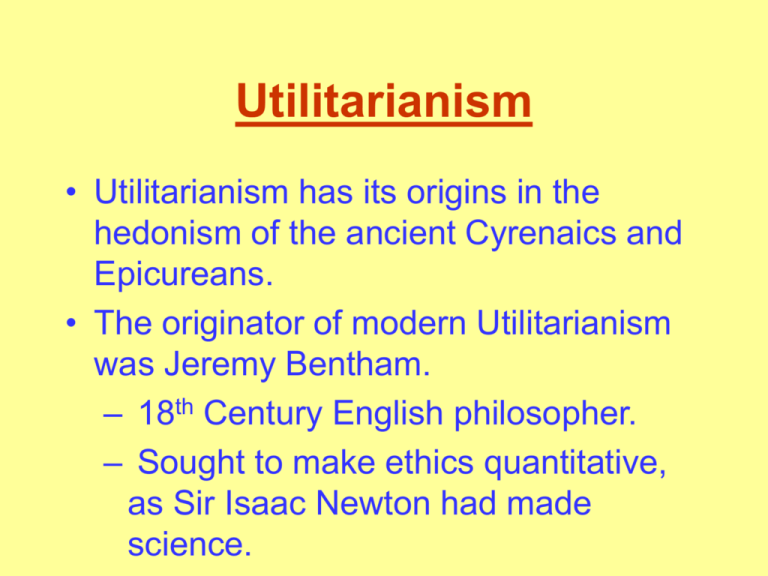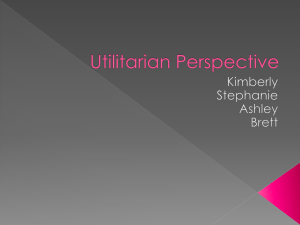PowerPoint No. 20 – Utilitarianism
advertisement

Utilitarianism • Utilitarianism has its origins in the hedonism of the ancient Cyrenaics and Epicureans. • The originator of modern Utilitarianism was Jeremy Bentham. – 18th Century English philosopher. – Sought to make ethics quantitative, as Sir Isaac Newton had made science. • The Fundamentals of Utilitarianism – All humans by nature seek to attain pleasure and avoid pain. • “Nature has placed mankind under the governance of two sovereign masters, pain and pleasure. It is for them alone to point out what we ought to do, as well as to determine what we shall do. On the one hand, the standard of right and wrong, on the other, the chain of causes and effects, are fastened to their throne. • “They govern us in all we do, in all we say, in all we think: Every effort we can make to throw off our subjection, will serve but to demonstrate and confirm it. In words a man may pretend to abjure their empire: But, in reality, he will remain subject to it all the while.” Jeremy Bentham, Principles of Morals and Legislation • In taking this view of human nature, Bentham follows Thomas Hobbes and David Hume, as well as the ancient Cyrenaics and Epicureans – All humans, by nature, seek utility. • Utility: A balance of pleasure over pain. • “By utility is meant that property in any object, whereby it tends to produce benefit, advantage, pleasure, good, or happiness (all this in the present case comes to the same thing) or (what comes again to the same thing) to prevent the happening of mischief, pain, evil, or unhappiness to the party whose interest is considered . . . .” Jeremy Bentham, Principles of Morals and Legislation – Egalitarianism: Every individual’s utility counts the same as every other individual’s utility. – Thus, the proper goal of morality is to achieve the most overall utility. • “The community is a fictitious body, composed of the individual persons who are considered as constituting as it were its members. The interest of the community then is what? — the sum of the interests of the several members who compose it.” Jeremy Bentham, Principles of Morals and Legislation – For Bentham, utility is judged quantitatively only. • There is no accounting for the alleged quality of utility. • “Prejudice apart, the game of pushpin is of equal value with the arts and sciences of music an poetry. If the game of push-pin furnish more [utility], it is more valuable than either.” Jeremy Bentham, The Rationale of Reward • Bentham’s Seven Quantitative Utilitarian Criteria – Intensity • How strong is it? – Duration • How long does it last? – Certainty • How likely is it to happen? – Propinquity • How near at hand is it? – Fecundity • How likely is it to produce more? – Purity • How free of pain is it? – Extent • The number of people affected by it. • How to make a utilitarian moral choice – Determine who is affected by your choice. – Determine your alternatives. – Using the seven criteria, determine the utility for each affected individual for each alternative. – Sum up the total utilities for each alternative. – Choose the alternative that yields the most overall utility. • Rule Utilitarianism – Doing a utilitarian analysis for every moral choice is virtually impossible. – Thus, most contemporary utilitarians prefer rule utilitarianism. – Rule Utilitarianism: Follow the rules that, in the long run, produce the most overall utility. – With rule utilitarianism, the utilitarian analysis is done only once, when deciding which rules to follow. – After that, moral choice is just a matter of following the rules. • Objections to Utilitarianism – “It’s a pig morality.” • Humans are too noble for a morality that only seeks to maximize pleasure and minimize pain. • Bentham’s response: – Get over it! – Humans are nothing more than pleasure seekers and pain avoiders. • John Stuart Mill’s Response – 19th Century English philosopher – Bentham’s godson – Tried to reform utilitarianism so that quality, not just quantity, matters, when evaluating utility. – “If one of two [pleasures] is, by those who are competently acquainted with both, placed so far above the other that they prefer it, even though knowing it – “to be attended with a greater amount of discontent, and would not resign it for any quantity of the other pleasure which their nature is capable of, we are justified in ascribing to the preferred enjoyment a superiority in quality, so far outweighing quantity as to render it, in comparison, of small account.” John Stuart Mill, Utilitarianism – But what does this really prove? – Later on, Mill shows his elitist biases. – “Few human creatures would consent to be changed into any of the lower animals, for a promise of the fullest allowance of a beast’s pleasures; no intelligent human being would consent to be a fool, no instructed person would be an ignoramus, – “no person of feeling and conscience would be selfish and base, even though they should be persuaded that the fool, the dunce, or the rascal is better satisfied with his lot than they are with theirs. They would not resign what they possess more than he for the most complete satisfaction of all the desires which they have in common with him . . . . – “It is better to be a human being dissatisfied than a pig satisfied; better to be Socrates dissatisfied than a fool satisfied. And, if the fool, or the pig, are a different opinion, it is because they only know their own side of the question. The other party to the comparison knows both sides.” John Stuart Mill, Utilitarianism – What it boils down to is this: » Mill is saying, if you want to know what pleasures are qualitatively better, ask a person of culture and refined taste. » In other words, ask a person that thinks like I do. – Mill’s attempt to introduce a qualitative element into utilitarianism is generally considered a failure. – “The good of the many outweighs the good of the one.” • Utilitarianism seems to allow sacrificing the individual for the good (utility) of the group. • Is this just? – This consequence is contrary to the intuition that each human person has an inherent dignity that should not be sacrificed, no matter how much society as a whole gains from the sacrifice. • An example is an episode of Star Trek: The Next Generation – The Enterprise encounters an alien race called the Edo who seem to be living the life of Paradise. – When Wesley, the son of the ship’s doctor, accidentally breaks one of the Edo’s rules, the Star Fleeters find out the high cost of the Edo Paradise. – Captain Picard comes to the conclusion that the value of the individual sometimes outweighs the cost to the group. – The conviction that all humans have a fundamental dignity that should not be violated or sacrificed is the key to Deontology, which is the ethical tradition we will look at next time.



